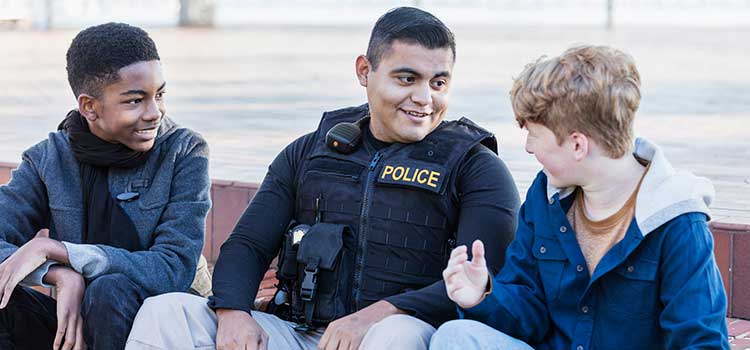In this Article
Police Officer Job Description

Police officers enforce the laws of a community, keep neighborhoods safe, and respond to emergency situations. Whether city, county, or state officers, police perform a wide variety of services for the public related to enforcing laws and stopping crime.
Police officers, patrol officers, deputies, troopers—whatever they are called and whoever they work for, they are considered sworn officers. That is, each individual has taken an oath to serve the public with courage and integrity and to uphold the values of the community.
Careers in Local and State Law Enforcement
Both local and state police officers provide the same functions in their jurisdictions, though they may hold slightly different titles.
The daily duties of an officer vary to suit the needs of the community they serve. For example, a large metropolitan city will have different law enforcement priorities compared to a rural, low-populated area.
All but the smallest police forces are divided into units that concentrate on one activity.
Beat Officers
What you’ll do: Beat officers are assigned an area or region to patrol. They monitor the area for suspicious activities or dangers and respond to both emergency and non-emergency calls. They may write citations for traffic or other violations, serve warrants, respond to accidents, provide traffic or crowd control, arrest suspects, and interview witnesses.
Where you’ll work: Beat officers spend most of their time in patrol cars, though a few may be assigned to foot, motorcycle, or bicycle patrol. They may return to the police station to complete paperwork or interview arrestees.
Jurisdiction: A municipal police department will usually assign beat officers to defined neighborhoods or areas in the town or city.
Detectives and Criminal Investigators
What you’ll do: The goal of detectives and criminal investigators is to work with evidence and witnesses, identify suspects, and prepare a case for prosecution. After a crime has been committed, they may examine a crime scene, gather evidence, interview witnesses, and identify suspects. They may also conduct surveillance, participate in raids, and arrest suspects. Detectives work with crime scene investigators or forensic analysts to create a clear picture of what happened and who is culpable for the crime.
Where you’ll work: Detectives may spend much of their time in a police department office where they make phone calls, conduct computer searches, analyze documents, and interview persons of interest. They also visit crime scenes in the aftermath of an incident.
Jurisdiction: Both city and county police may employ detectives. Many state-level police also have detectives or investigators, but other states have separate agencies.
State Troopers/Highway Patrol Officers
What you’ll do: The main responsibilities of state troopers and highway patrol officers are to keep the highways safe by issuing traffic citations. They also respond to accidents and emergencies. Their visible presence on the roadways often encourages compliance with traffic laws. Additionally, they participate in inspections of commercial vehicles and community safety education.
Where you’ll work: Troopers and patrol officers work in patrol cars or motorcycles and drive through roadways in their jurisdictions.
Jurisdiction: State police employ troopers and patrol officers, though a few county-level police also have highway patrol units.
Sheriff’s Deputies
What you’ll do: Sheriff’s deputies, sometimes called sheriff’s police, are generally assigned to one area of a county to patrol the roads, enforce traffic laws, respond to citizen calls, and investigate crimes. Often, sheriff’s deputies are the primary law enforcement agents for people living in rural, unincorporated areas. As such, their jobs can be quite similar to a city beat officer.
Where you’ll work: You may spend much of your time in a patrol car, but you will also have to respond to emergencies, accidents, and residents’ calls.
Jurisdiction: Sheriff’s offices generally operate at the county level, though there are three states, Alaska, Hawaii, and Connecticut, that do not have sheriffs.
Transit and Railroad Police
What you’ll do: Transit police work on public transportation systems such as municipal subways, commuter rail, and buses. They provide safety and security for passengers and employees and provide quick response to emergencies. Railroad police serve a similar role on longer passenger railway routes. Transit and railroad police may also investigate crimes such as graffiti, pickpocketing, theft, and terrorism.
Where you’ll work: Railroad and transit police may work at stations and boarding platforms or ride in buses and trains with passengers.
Jurisdiction: Transit police are usually special divisions of a city police department. They have full police powers but are charged with patrolling public transportation.
Local vs State Officers: What’s the Difference?
The responsibilities of local and state police officers can often be virtually the same. Their biggest difference is in jurisdiction and primary purpose.
| City | County | State | |
|---|---|---|---|
| Jurisdiction | Within the boundaries of the town or city | County-wide, but may also have jurisdiction within town or city limits | In some states, troopers have jurisdiction statewide. State highway patrol may have jurisdiction only on highways. |
| Purpose | Police are charged with keeping cities free from crime, arresting offenders, and responding to emergency calls. | County police may patrol rural highways and perform police duties in unincorporated areas outside of city limits. | State troopers patrol highways and roadways to enforce traffic rules and assist with emergencies. |
Patrolling streets and roads are important parts of both local and state police. However, state troopers usually spend the majority of their time in their cars. City police may also be assigned to foot, bicycle, or mounted patrol.
In addition, the ranks in the chain of command are called by different names. For example, a police force is headed up by a supervisor, commissioner, or chief, whereas the highest command in a state police force is usually called a director, commissioner, or colonel.
Police Specialties
Police can go into specialized fields after gaining some experience and additional training. Popular specialty police jobs include:
Arson Investigator
Arson investigators specialize in determining the origins of fire by using techniques in crime scene investigation and forensic science. They work to identify how fires start and who or what might be responsible for causing them. To prepare for a career in arson investigation, you may need an associate degree in fire science or fire and arson investigation.
Crime Scene Investigator
Crime scene investigators examine the scene of a crime and collect evidence. They document the scene and the chain-of-custody for evidence and assist with processing and interpreting it to determine how a crime was committed and who the suspect might be. Crime scene investigators need at least an associate degree in forensic science.
Narcotics Officer
Narcotics officers use several strategies in detecting and preventing narcotics-related crimes such as drug possession and trafficking. They may use K-9 units, surveillance, or wire taps, or they may develop informants or go undercover. Narcotics officers usually work several years as a police officer before specializing.
Homicide Detective
A homicide detective works to solve murders by examining the evidence, interviewing witnesses, then identifying and arresting suspects. They work closely with crime scene investigators and may have to testify in court about the evidence. Homicide detectives start out as patrol officers and are promoted to the rank of detective. They often need additional training and education.
Park Ranger
Park rangers assist and protect visitors who visit city and state parks. They may search for lost hikers, rescue stranded mountain climbers, or help injured park visitors, as well as issue citations for actions that threaten the wildlife or damage the land. Park rangers need an associate degree in natural sciences, law enforcement, or recreation management.
Game Warden
Fish and game wardens, or conservation officers, protect the wildlife in a natural area while also assisting people who visit. They enforce laws pertaining to fishing and hunting, monitor areas for safety, and investigate crimes such as poaching and illegal use of lands. An associate degree in criminal justice, wildlife management, or environmental science may be required by some jurisdictions.
Police Skills: What You Need to Succeed
Law enforcement officers need education and training, as well as sound moral character. But they also need physical strength and the right temperament. During police training, an officer must demonstrate physical fitness and abilities.
“It’s kind of like the military,” says Stephen Webb, head of the criminal justice program at Regent University in Virginia Beach, VA. “They have standards you have to meet.”
The fitness test may require a minimum number of repetitions in a specified time. The number or time may be adjusted for gender and age. In many police organizations, officers must complete the physical fitness test annually.
Certain personality traits are also crucial to success. They include qualities such as:
Finally, a police officer must have a good knowledge of the law and a strong sense of ethics.
What Education is Required to Become a Police Officer?
Although it’s possible to be hired as a police officer with only a high school diploma, some law enforcement organizations require a minimum of an associate degree. An associate or bachelor’s degree could make you more competitive, especially if you wish to specialize, and could result in a higher salary.
| Degree | Credit Hours Needed | Time to Complete |
|---|---|---|
| Associate Degree | About 60 | Two years |
| Bachelor’s Degree | About 120 | Four years |
| Master’s Degree | 30 to 40 (after completing a bachelor’s degree) | Two years |
Common degree programs for aspiring police officers include:
A degree will could also help you get move up through the ranks. Bachelor’s degrees or master’s degrees may be required at the highest levels. Requirements vary widely from one police agency to another.
You will also need to attend a police training facility where you will learn about the laws in your jurisdiction and practice policing techniques.
What About Certification?
Most states require you to pass tests and earn state certification as a police officer. Each state sets its own certification standards, although there is a growing movement to create a national certification program.
When you successfully finish your police academy training, you will earn Peace Officer’s Standards and Training (P.O.S.T.) certification or something equivalent. Individual states determine the standards for certification. You may also earn certifications in specific skills like firearms.
Throughout their careers, police officers regularly participate in training exercises, seminars, and workshops. Some are required while others are voluntary. This continuing education is offered by police training academies, colleges and universities, and law enforcement organizations and associations.
Officers may work toward developing skills and earning certifications in specialties such as:
How Long Does It Take to Become a Police Officer?
It’s possible to be hired by a police department as a sworn officer right after high school graduation in some locations, but most law enforcement organizations require applicants to be at least 20 or 21 years old.
If you decide to go to college, it will take about two years to finish an associate degree. You can speed up the completion of your degree by taking classes during the summer or enrolling in an accelerated degree program with shorter semesters (such as 8 weeks instead of 16 weeks). A bachelor’s degree usually takes about four years.
Police officer candidates also have to attend police training academy. The length of training varies by state but ranges from about 6 weeks to 24 weeks.
Support personnel, such as clerks and dispatchers, can usually begin work without a college degree.
Police Officer Career FAQs
Q: How old do you have to be to be a police officer?
A: The minimum age depends on the location and the specific police departments. Some will allow 18-year-olds to apply but most require that you’re at least 20 or 21.
Q: What’s included in a background check?
A: The background check will investigate whether you have a criminal history or a pattern of trouble with authority. It will also take a look at your credit history, school records, and military records (if applicable). Your former teachers, friends, and neighbors may be interviewed.
Q: How quickly can I move up the ranks in a police force?
A: Promotions are based on years of experience, qualifications, training and education, and aptitude. Each police force sets its own standards for how quickly you can move up. It usually takes a few years at one rank before you’re eligible to apply for the next higher rank.
Q: Can you become a police officer if you have used drugs?
A: Police forces usually have a cut-off time of three to seven years for past drug use. They may be more critical of hard drugs than marijuana. Dealing drugs will be an automatic disqualifier.


